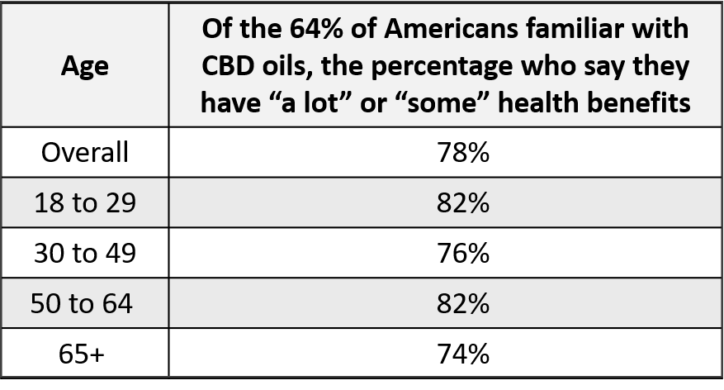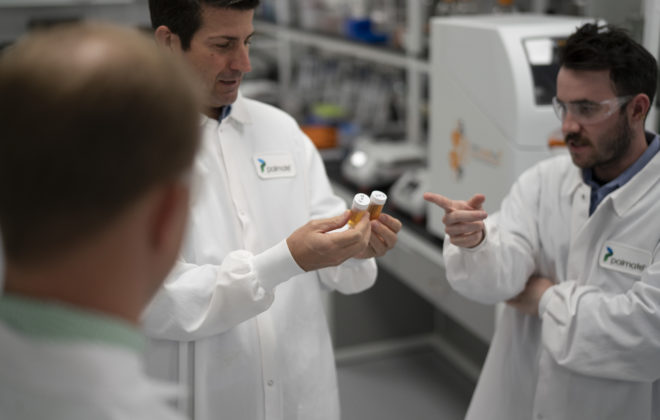
The Logical Leap: 5 Reasons Why You Should Integrate CBD into Your Business
The time is right for CBD. Cultural, legislative, and scientific factors are converging to make interest in CBD soar. For businesses that want to innovate their product lines with natural ingredients, taking a closer look at CBD is a logical next move.
Below, we’ll dive into five big reasons why you should consider integrating CBD into your business.

1. Wellness without intoxicating effects
CBD (short for cannabidiol) is derived from hemp, which is a variety of the cannabis plant. More specifically, CBD is the second most prevalent of more than a hundred naturally occurring phytocannabinoids in cannabis. These are the key to the plant's therapeutic potential.
What’s particularly important to note about CBD is that it doesn't induce a euphoric, sedative, or intoxicating state that gets people “stoned” or “high.” That would be CBD’s chemical cousin THC (tetrahydrocannabinol), the most prevalent phytocannabinoid.
Thus, CBD is an especially compelling ingredient for a wide array of products because it holds possible health and wellness benefits but does not present the same types of risks, controversies, and related complexities that come with THC.

2. Our own endocannabinoid system strengthens the science behind CBD
Humans and many other animals actually have an endocannabinoid system (ECS), which includes receptors in the brain and throughout the body. Endocannabinoids—cannabinoids we produce within our own body—bind with these receptors to help regulate numerous physiological processes.
Because the ECS is so widespread within the body, it plays a key role in the normal functioning of everything from our cardiovascular and gastrointestinal systems to our central nervous and immune systems.
Research has suggested that cannabinoids such as CBD may also help in the functioning of these systems.

3. 78% of Americans familiar with CBD believe it has health benefits
The idea of “wellness” is now more than a trend—it’s a cultural movement. As the Global Wellness Institute puts it, wellness involves people pursuing “activities, choices and lifestyles that lead to a state of holistic health.”
That definition is helpful because it speaks to the fact that people not only want more options for enhancing their health; they’re consciously seeking new ways to do it. And that involves an openness to new products.
For example, in a Gallup survey, of the 64% of Americans who say they are familiar with CBD oils, a large majority say they have either “a lot” or “some” health benefits. Importantly, these encouraging numbers span the generations:

No matter what products you provide, more and more of your customers will likely be looking for CBD-infused options to incorporate into their pursuit of wellness.

4. Evolving regulations mean CBD is no longer guilty by association
Hemp and marijuana are both cannabis plants, but CBD is derived primarily from hemp. Unfortunately, the cannabis umbrella has led to hemp often being guilty by association with marijuana. But that’s rapidly changing.
Major regulatory developments like the following exemplify the positive momentum that’s been established for the future of CBD:
Agricultural Act of 2014. This helped to legally distinguish industrial hemp from marijuana. More specifically, it helped initiate pilot programs for cultivating industrial hemp legally.
Agriculture Improvement Act of 2018. Also known as The 2018 Farm Bill, the act exempted hemp and hemp-derived substances from the list of Schedule I drugs under the Controlled Substances Act.
To put that in perspective, it’s now legal to produce and consume hemp-derived CBD that contains less than 0.3% THC—a monumental step forward for CBD’s future.
Hemp Access and Consumer Safety Act. Yes, the aforementioned Farm Bill was a great legal development, yet regulatory ambiguity remains. The encouraging news here is that further legislation is being actively pursued. In fact, the Hemp Access and Consumer Safety Act could be a game changer.
Should this bipartisan effort become law, it will, according to the official news release, “ensure hemp-derived CBD products are regulated by the U.S. Food and Drug Administration (FDA) like other legal products used in dietary supplements, foods and beverages—an action that is essential to protecting consumer safety and treating hemp producers fairly.”
CBD-based, FDA-approved Epidiolex. When the FDA approved Epidiolex in 2018, it marked a watershed moment for CBD. Epidiolex represents the first FDA-approved medicine derived from cannabis and has generated an added level of legitimacy to CBD’s profound therapeutic potential.

5. Potential $20 billion CBD market by 2024
The details above provide just a glimpse of why CBD’s future is a bright one. How bright is it? According to Forbes, a recent study conducted by cannabis researchers BDS Analytics and Arcview Market Research predicts that by 2024 the collective U.S. CBD market will exceed $20 billion—and reach a compound annual growth rate of 49%.
On top of that, the research indicates that general retail stores, rather than cannabis dispensaries, will soon be selling the majority of CBD products, a clear indication of CBD entering the mainstream market.
Keep the focus on quality CBD ingredients for your next move
If you want to learn more about integrating CBD into your product line, initiate a conversation with a qualified cannabinoid ingredient supplier who is committed to transparency in its practices.
Also, keep this crucial factor in mind: Public interest, regulatory momentum, sales potential—these are all important factors for integrating CBD into your business. But high-quality CBD research will be the cornerstone to its robust future.
Palmate, for example, has set out to build a knowledge-based future for cannabinoid products.
We believe in the value of extensive research to inform, educate, and innovate. That’s why we’re involved in clinical research efforts to validate the therapeutic benefits of cannabinoids.
By collaborating with organizations and government agencies, we can continually innovate in ways that lead to consistent, reliable, and effective cannabinoid products. That means a better future for the industry and better lives as a result.
Wondering how Palmate can provide cannabinoid ingredients that unleash the full potential of your products?
Related Posts
Recent Posts
- 7 Questions to Help You Find a Trustworthy CBD Ingredient Company
- Why CBD Companies Should Re-Examine Their Marketing Content—NOW
- Qualifying an Ingredient Supplier for Your CBD-Infused Beverage Products: 5 Crucial Questions to Ask
- The Logical Leap: 5 Reasons Why You Should Integrate CBD into Your Business
- GFSI-Recognized Certification: How Cannabinoid Ingredient Suppliers Can Help Manufacturers Succeed
Categories
- Best Practices (4)
- CBD and Business (3)
- Certifications (1)



